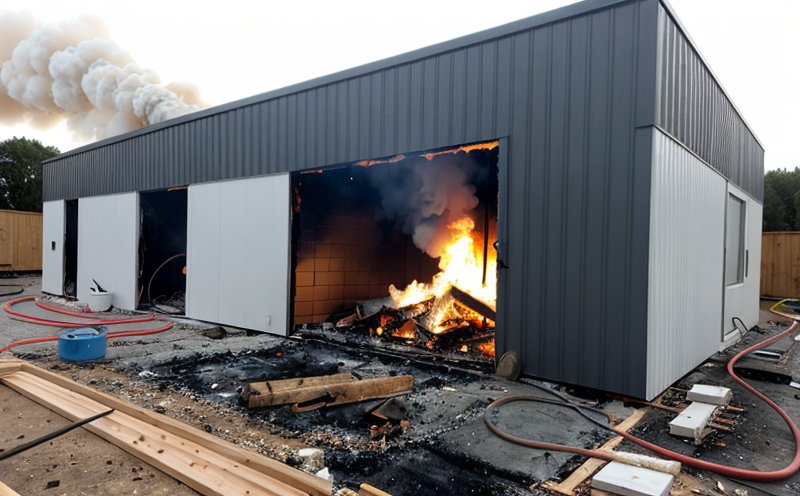Fire Resistance Assessment of Ventilated Facades
The assessment of fire resistance in ventilated facades is a critical aspect of building safety and compliance with international standards. Ventilated facades are widely used due to their insulating properties, aesthetic appeal, and the ability to reduce heating costs. However, these systems must meet stringent fire performance requirements to protect lives and property.
The European Union (EU) and other regions have implemented regulations that mandate the testing of ventilated facade units to ensure they can withstand exposure to fire without compromising structural integrity or spreading flames. The primary focus is on preventing the spread of fire from one compartment to another, which could lead to catastrophic consequences in high-rise buildings.
The process involves subjecting a sample of the ventilated facade unit to controlled fire conditions in a laboratory setting. This test aims to determine how well the facade can resist ignition and how long it remains stable under these extreme conditions. The performance is assessed based on various parameters, including flame spread, heat release rate, smoke production, and structural integrity.
Specimen preparation for this test includes fabricating a representative sample of the ventilated facade system according to the design specifications provided by the client or as per standard procedures (e.g., ISO 15240-3). The specimen is then placed in the fire resistance chamber, where it is exposed to either a gas-fired flame or an electrically heated furnace. The duration and intensity of exposure are carefully controlled to simulate real-world fire scenarios.
During the test, sophisticated instrumentation measures critical parameters such as temperature rise within the compartment, smoke production, and the rate at which flames spread across the facade surface. These measurements help evaluate the effectiveness of the insulation materials and cladding in retarding or inhibiting fire growth. Structural integrity is also assessed by monitoring deflections, deformations, and any potential failure points.
The results of these tests are compiled into a detailed report that provides comprehensive insights into the fire performance of the ventilated facade system. Compliance with relevant standards (e.g., EN 13679:2014) is verified, ensuring that the product meets legal and regulatory requirements. This data can be used by architects, engineers, and builders to make informed decisions about material selection and design optimization.
Understanding the fire behavior of ventilated facades is essential for designing safe and compliant buildings. By conducting thorough assessments at various stages of development, stakeholders can address potential issues early on and implement necessary improvements. This approach not only enhances public safety but also supports sustainable building practices by promoting energy-efficient designs that are resilient to fire risks.
Fire resistance assessment plays a pivotal role in safeguarding communities from the devastating impacts of fires. It ensures that buildings equipped with ventilated facades meet stringent safety standards, thereby contributing to overall urban resilience and reducing the likelihood of widespread damage or loss of life during emergencies.
- Comprehensive Evaluation: Extensive testing covering flame spread, heat release rate, smoke production, and structural integrity.
- Regulatory Compliance: Verification against international standards like EN 13679:2014 to ensure legal adherence.
- Data-Driven Insights: Detailed reports providing actionable information for continuous improvement in design and material selection.
Benefits
The fire resistance assessment of ventilated facades offers numerous advantages that contribute significantly to the safety, efficiency, and sustainability of buildings. By ensuring compliance with strict regulations, this service helps protect occupants from potential hazards while enhancing structural integrity during fires.
Enhanced Safety: The primary benefit is the assurance that building components will perform reliably under extreme conditions, protecting lives and minimizing property damage. This peace of mind is crucial for developers and owners who prioritize safety in their projects.
Legal Compliance: Adherence to local and international standards such as EN 13679:2014 ensures that all aspects of the facade meet regulatory requirements, avoiding costly penalties or legal disputes. This compliance also fosters trust among stakeholders and enhances brand reputation.
Sustainable Design: The assessment process promotes the use of environmentally friendly materials that contribute to sustainable construction practices. By selecting appropriate insulation and cladding solutions based on test results, architects can design more eco-friendly buildings without compromising safety or performance.
Economic Efficiency: Early identification of any shortcomings through testing allows for prompt rectification at minimal cost, preventing expensive rework later in the project lifecycle. Additionally, reliable fire resistance reduces insurance premiums and liability risks associated with non-compliant structures.
Innovation Support: Engaging in rigorous testing encourages continuous improvement in material science and engineering techniques, leading to innovative solutions that push boundaries beyond current norms. This forward-thinking approach benefits both industry leaders and emerging players alike.
Eurolab Advantages
EuroLab stands out as a premier provider of fire resistance assessment services for ventilated facades due to its state-of-the-art facilities, experienced professionals, and unwavering commitment to quality. Our expertise spans across multiple sectors including architecture, engineering, construction, and product development.
Advanced Facilities: Equipped with cutting-edge laboratories that simulate real-world fire scenarios, we offer precise control over environmental conditions for accurate testing outcomes. These resources enable us to deliver reliable results consistently.
Experienced Professionals: Our team comprises highly skilled engineers and scientists who possess extensive knowledge in materials science, structural engineering, and building technology. Their diverse backgrounds allow them to approach each project uniquely while leveraging best practices from around the globe.
Comprehensive Services: From initial consultation to final report delivery, EuroLab provides a full spectrum of services tailored specifically for ventilated facade assessments. This holistic approach ensures that every aspect of your project receives thorough attention and expertise.
Global Recognition: EuroLab's commitment to excellence has earned us international acclaim across various industries. We adhere strictly to recognized standards like EN 13679:2014, ensuring our work aligns with global best practices and expectations.





